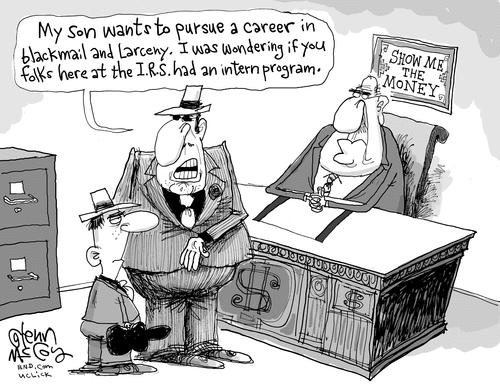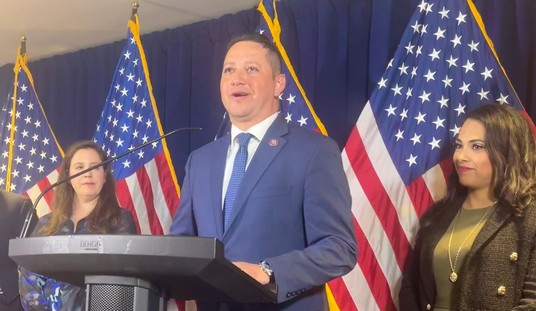I don’t particularly care how people vote, but I do care whether they believe in freedom.
That’s why I periodically share stories that should convince everyone to believe in the libertarian philosophy of small government, individual liberty, and personal responsibility.
The stories that get me most agitated are the ones that involve innocent people being robbed by bureaucrats.
And when I say robbed, I use that word deliberately.
Such as the case of an elderly couple who had their hotel stolen by government.
Such as the case of the family grocer who had his bank account stolen by government.
Such as when the government wanted to steal someone’s truck because a different person was arrested for drunk driving.
 Such as when the government tried to steal the bond money a family collected to bail out a relative.
Such as when the government tried to steal the bond money a family collected to bail out a relative.
Such as when the government seized nearly $400,000 of a business owner’s money because it was in the possession of an armored car company suspected of wrongdoing.
Such as when the government sought to confiscate an office building from the owner because a tenant was legally selling medical marijuana.
Such as when the government killed a man as part of an anti-gambling investigation undertaken in hopes of using asset forfeiture to steal other people’s cash.
With all this background, you can probably guess I’m going to add to that list.
And you’re right. We have a report from the New York Times that has me frothing at the mouth. I can’t imagine any decent person not being outraged by this example of big government run amok.
For almost 40 years, Carole Hinders has dished out Mexican specialties at her modest cash-only restaurant. For just as long, she deposited the earnings at a small bank branch a block away — until last year, when two tax agents knocked on her door and informed her that they had seized her checking account, almost $33,000. The Internal Revenue Service agents did not accuse Ms. Hinders of money laundering or cheating on her taxes — in fact, she has not been charged with any crime. Instead, the money was seized solely because she had deposited less than $10,000 at a time, which they viewed as an attempt to avoid triggering a required government report.
Recommended
In other words, this is an example of two evil policies – asset forfeiture laws and money laundering laws – coming together in a vortex of we’ll-screw-you-over-even-if-you’re-law-abiding statism.
And you can forget about the Constitution’s presumption of innocence.
Ms. Hinders said in a recent interview. “Who takes your money before they prove that you’ve done anything wrong with it?” The federal government does. Using a law designed to catch drug traffickers, racketeers and terrorists by tracking their cash, the government has gone after run-of-the-mill business owners and wage earners without so much as an allegation that they have committed serious crimes. The government can take the money without ever filing a criminal complaint, and the owners are left to prove they are innocent. Many give up.
Of course, much of tax code enforcement is based on the upside-down premise that taxpayers are guilty and have to prove themselves innocent.
But that still doesn’t make it right. And the IRS is just the tip of the iceberg. Stealing is now a common practice by all sorts of bureaucracies at all levels of government.
The practice has swept up dairy farmers in Maryland, an Army sergeant in Virginia saving for his children’s college education and Ms. Hinders, 67, who has borrowed money, strained her credit cards and taken out a second mortgage to keep her restaurant going. Their money was seized under an increasingly controversial area of law known as civil asset forfeiture, which allows law enforcement agents to take property they suspect of being tied to crime even if no criminal charges are filed. Law enforcement agencies get to keep a share of whatever is forfeited. Critics say this incentive has led to the creation of a law enforcement dragnet, with more than 100 multiagency task forces combing through bank reports, looking for accounts to seize.
Here’s just one horrifying example of how this process works.
In one Long Island case, the police submitted almost a year’s worth of daily deposits by a business, ranging from $5,550 to $9,910. The officer wrote in his warrant affidavit that based on his training and experience, the pattern “is consistent with structuring.” The government seized $447,000 from the business, a cash-intensive candy and cigarette distributor that has been run by one family for 27 years. …the government seized $447,000, and the brothers have been unable to retrieve it. …Mr. Potashnik said he had spent that time trying, to no avail, to show that the brothers were innocent. They even paid a forensic accounting firm $25,000 to check the books. “I don’t think they’re really interested in anything,” Mr. Potashnik said of the prosecutors. “They just want the money.” …“We’re just hanging on as a family here,” Mr. Hirsch said. “We weren’t going to take a settlement, because I was not guilty.”
Still not convinced about the venality of big government? Here’s another nauseating example.
Army Sgt. Jeff Cortazzo of Arlington, Va., began saving for his daughters’ college costs during the financial crisis, when many banks were failing. He stored cash first in his basement and then in a safe-deposit box. All of the money came from paychecks, he said, but he worried that when he deposited it in a bank, he would be forced to pay taxes on the money again. So he asked the bank teller what to do. “She said: ‘Oh, that’s easy. You just have to deposit less than $10,000.’” The government seized $66,000; settling cost Sergeant Cortazzo $21,000. As a result, the eldest of his three daughters had to delay college by a year. “Why didn’t the teller tell me that was illegal?” he said. “I would have just plopped the whole thing in the account and been done with it.”
By the way, some of you may be thinking that these terrible examples are somehow justifiable because the government is stopping crime in other instances.
 But that’s not true. Experts who have looking at money laundering laws have found that there’s no impact on genuine criminal activity. But lots of costs imposed on innocent people.
But that’s not true. Experts who have looking at money laundering laws have found that there’s no impact on genuine criminal activity. But lots of costs imposed on innocent people.
Which probably explains why the first two directors of the Justice Department’s Asset Forfeiture Officenow say the laws should be repealed.
If you want more information, here’s my video on the government’s costly and failed war on money laundering.
Sigh.
By the way, the government also abuses people in ways that have nothing to do with money laundering or asset forfeiture.
- The federal government threatened to imprison a woman for whistling at a whale.
- A must-be-read-to-be-believed story of vicious IRS persecution.
- A video about how the EPA tried – and fortunately failed – to destroy a family.
- A story about the Justice Department’s discriminatory attack on a hapless homeowner.
- Bureaucrats in Indiana conducting a spite-motivated legal attack against a family that saved a baby deer.
- A local government in Virginia unfairly trying to destroy an organic farmer.
- Statists must dislike organic farms because Texas bureaucrats conducted a paramilitary raid on one of them
- Park Service bureaucrats threatening a business if it allowed tourists to use bathroom facilities.
And there are more examples where those came from.
























Join the conversation as a VIP Member